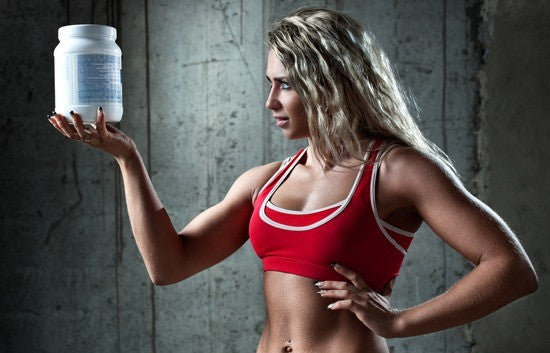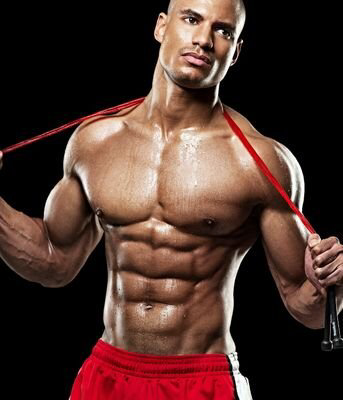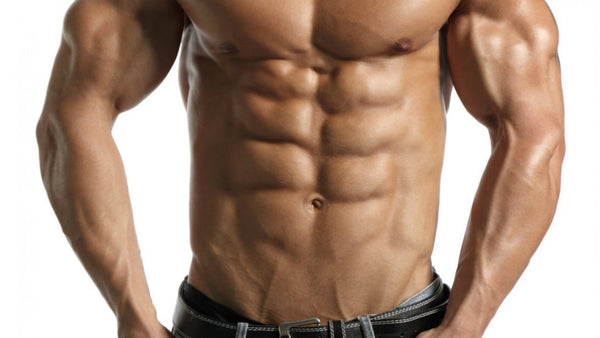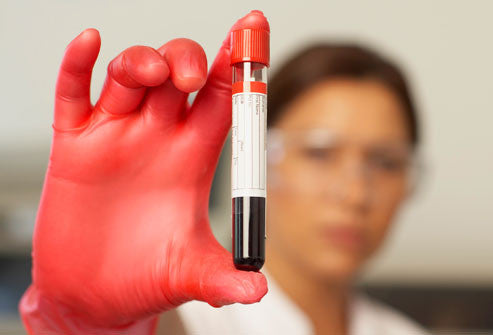What’s the best protein powder for women?

Are you confused by all the options of protein powders? Are you trying to find the best protein for women? Keep reading because we have ALL the answers right here.
One question that I commonly hear in the fitness/supplement industry is “What is the best protein for women?” or “Do you have protein for women?” The short answer is… No. There is no such thing as “protein for women”. You wouldn’t walk into your favorite grocery store asking for “chicken breasts for women”, would you? Of course not! The reason this question is always asked stems from misconceptions about getting too big or that protein makes women bulky or manly. The same goes for your protein powder. The protein that you purchase will be solely determined by the goals that you are trying to reach. You could be looking for a meal replacement or something to help you lose weight or to gain weight. I’m going to go over some of the different types of protein and things to consider when buying to help you gain a better understanding of which protein will best align with your needs and goals and how it should be used.
Whey
If you talk to anyone in the health and fitness industry they’re going to tell you that whey is the best type of protein out there. It has the highest bioavailability, meaning that it has the highest absorption rate.
Whey is a liquid that used to be considered a wasteful by-product of cheese and curd. It wasn’t until people discovered its high protein content that people started to see the light. Whey has also been found to have a high content of leucine, which plays a crucial role in protein synthesis. This means that it aids in the growth of lean muscle tissue. There are 3 types of whey protein: there is whey isolate, whey concentrate, and hydrolyzed whey. Each of these is going to have different bioavailability due to the fact that some of these go through additional processes to remove additional lactates and make it faster absorbing.
Whey Concentrate
Whey’s original state consists of a mixture of mostly water with some protein, fat, carbohydrates and lactose. It then goes through filtration processes to remove fats, lactose, and carbohydrates among other things. Once the filtration process is complete, what remains is around 80% whey protein.
Whey Isolate
Once the whey concentrate is completed, it can go through additional processes to filter out even more fat, lactose and carbs. This is how whey isolate is made. The further filtration processes give isolate up to 90% protein! This means that per 100 grams you get 90 grams of protein.
Whey Hydrolosate
Whey Hydrolosate is a predigested form of whey. This means that digestive enzymes have been added to the whey to reduce the size of the peptide molecules and to speed up the absorption and amino acid availability. Although hydrolosate is often considered the premier form of whey, it is also usually the most expensive.
Like stated before, whey is often considered the highest quality of protein and it is the most popular protein used in the fitness industry. It’s great for recovery, since the protein can be absorbed at a much higher rate than most other proteins.
If you have trouble taking in enough protein for the day, whey can definitely help you to reach your optimal levels of protein without adding any extra fat or carbohydrates to your diet. The isolate form can be great for people who are lactose intolerant due to the isolation process separating the protein from the lactose - however, even if you are not lactose intolerant, you can be allergic to the proteins found in cow’s milk. There are a lot of really great whey proteins out there so I’ll just name a couple as some examples. Gold standard by Optimum Nutrition is a staple protein that is one of the most popular on the market. Isolicious by CTD is another great whey I would recommend. It has no sugars, fats, and is extracted from grass-fed cows. Isolicious is also made to taste like some of your favorite cereals from when you were a kid, so they taste DELICIOUS. Iso100 by Dymatize is a high-quality hydrolyzed whey that tastes great as well.
Casein Protein
Just like whey, casein also comes from milk. Unlike whey, casein is a slow-digesting protein, resulting in a more gradual release of amino acids. Typically, casein isn’t recommended for a post workout due to its slow digesting properties. If you were going to have to choose a milk-based protein for after your workout, I would recommend sticking with a solid whey protein. Casein, however, can be a great meal replacement or snack to be able to get a nice slow release of protein through the day. Casein is most commonly used before bed-time. People use it this way to get a good slow digesting protein throughout the night so they can avoid muscle breakdown.
Egg Protein
Egg protein, as you can imagine, is an extract from egg whites. Egg protein was the most popular protein source before whey started gaining popularity in the 90s. The macronutrient count for egg protein is nearly the same as whey, which means they contain nearly the same amount of fats, carbs, and protein per scoop. Although, some of the higher filtered whey can have a lower count of carbs, egg white protein is devoid of fats. If you are lactose intolerant this is a fantastic alternative (probably the best) to whey.
Plant Protein
There are very many variations of plant proteins. Some of which include: pea protein, hemp protein, rice protein and soy protein. There are a variety of complaints when it comes to these types of proteins that are common amongst long-time, gym avids. With plant protein, the major complaint is that you don’t get the same amino acid profile as you would with an animal based protein. This doesn’t mean that it’s an incomplete protein, you’re still getting the protein you need. This just means that you don’t get the amounts of EAAs that people normally look for in their protein. Typically, you would want to take some sort of mixture of rice and pea or any other plant protein to really get the same benefits and amino profile that you would with whey. Even with all of these accusations, plant based proteins are still a great product to buy for people who are vegans. Although, if you are not vegan, I recommend that you go with another form of protein.
Mass Gainer
Mass gainers, I know, I know this doesn’t seem like a popular product that women go for, but there are some women who do want or need a protein like this! The purpose of using a mass gainer is in the name… to gain mass. These products are loaded with carbs to help with obtaining additional calories to help you put on size. These additional carbs are also very good for after a workout. They give you an increased insulin spike so your muscles can absorb more amino acids. Many of these products also contain a variety of good fats to aid you with staying lean while you put on size, but if you’re using it for your post workout, try to find one with less fats in it; fats will slow the digestion of the protein and inhibit immediate absorption. Getting all of these calories in after a workout is great due to the fact that this is when your body can utilize them the most. So if you’re someone who has struggled with gaining weight, or if you are just looking to add on some size and muscle, this is the protein for you. Side note; this is more than likely the type of protein most women are afraid of and get confused with other proteins.
Meal Replacement
Meal replacement shakes are going to be more geared for weight-loss as opposed to helping with recovery or muscle gain. Remember, muscle gain doesn’t mean making you huge or bulky. Most of these meal replacement powders are going to try to emulate a nice snack or lean meal. They WILL have carbs in them along with fats. Again, this is to try to replicate consuming a small, lean meal. They typically contain a good amount of fiber. This is to ensure that you will stay full and have less temptation to continue eating. You just need to make sure the sugar content is low. I mostly recommend this type of protein to people whom just need some help with their overall diet. These shakes are great for supplementing protein when you are not getting enough throughout the day.
Important things to consider when buying protein
The most important thing to keep in mind when buying a protein is… YOUR GOAL! What you are working for and trying to achieve is the center point of your decision-making. If you are working out and need something to aid with recovery, the protein you choose is going to be much different than someone who is trying to gain weight. You want to make sure the macronutrient breakdown of the protein powder aligns with your goals. These include proteins, fats, and carbohydrates. When you are looking for a protein, you want to find something with the least amount of fats and carbohydrates as possible. Unless you are looking for a meal replacement, you want to find one with the right amount of carbohydrates and protein that could be enough for a meal. Again, these are going to be totally dependent on your goals. There are many products that are specifically made for women, such as women’s multivitamins, but protein is not one of them.
Protein per scoop
I’m sure many of you are thinking “it’s a protein powder, isn’t it all protein?” Unfortunately, this is not the case. Many companies put fillers in their protein powders when trying to get the flavoring right. A quick tip is to look at the scoop size on the nutritional label (typically they are in grams) and see how much protein is in each scoop. If the scoop size is 45 grams and the protein content is 22 grams, then it’s not a very high quality protein. However, this does not apply to mass gainers. Like stated earlier mass gainers are purposefully filled with extra carbs and things of that nature, so naturally you are not only getting protein with this type of product.
Key takeaways when looking for a good protein for women
Now that you know are more informed on the different kinds of protein let’s go over some of the key takeaways:
- What type of protein you get is going to be totally dependent on your goals.
- Always look at the amount of fats and carbs
- Look at the protein per scoop
- Whey is going to be the fastest absorbing and highest quality protein
- Whey isolate is still ok to use if you are lactose intolerant, but you can still be allergic to the proteins found in cow’s milk
- Casein is a slow digesting protein that is great to take at night for a slow release of protein throughout the night
- Egg protein is a great alternative for women who can’t drink whey
- Plant proteins are a great alternative for women who are vegans, but it doesn’t contain the amino acid profile that an animal or milk based protein will.
If you have any more questions over what types of protein to buy, feel free to contact one of our support staff either at info@advantagesupplements.com or message us on our facebook page!
---------------------------------------------------------
John “Obie” Oberkircher is the Marketing Director for Advantage Supplements. Obie has gained a thorough amount of knowledge throughout his years in the fitness industry. His vision and passion for helping others achieve their health and fitness goals is his primary objective for Advantage Supplements as a company, and the direction he wants to continue to take.
Leave a comment
Comments will be approved before showing up.



